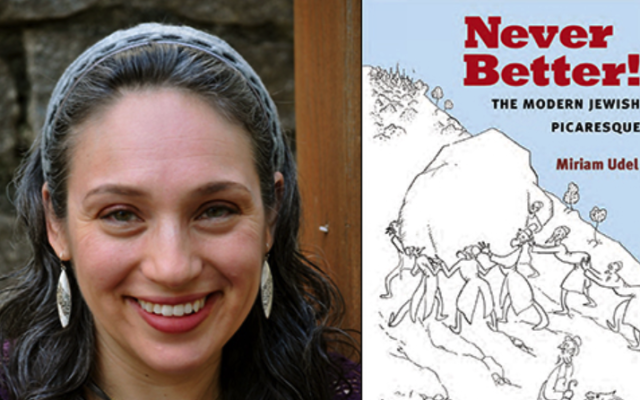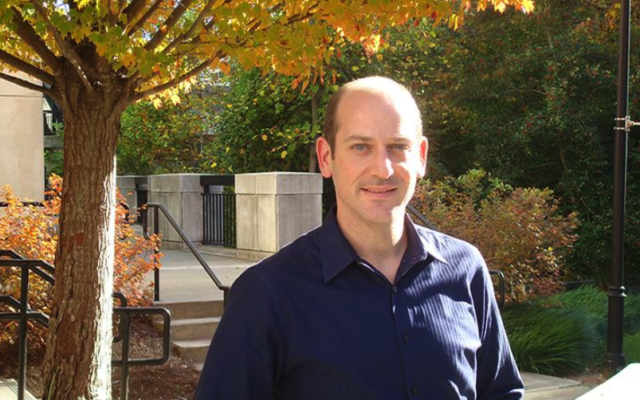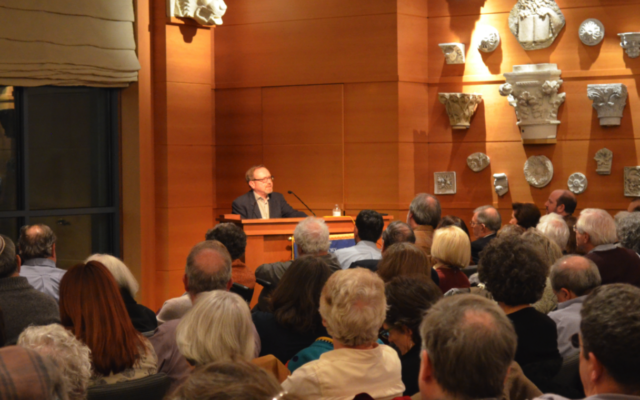Miriam Udel Named Director of Tam Jewish Institute
Yiddish studies professor to succeed Eric Goldstein who led effort to reorganize the Tam Institute.

Miriam Udel, an associate professor of Yiddish Language, Literature and Culture at Emory University, has been named the new director of the school’s Tam Institute for Jewish Studies. Udel, who began teaching at Emory in 2007, won the 2017 National Jewish Book Award in Modern Jewish Thought and Experience for her book “Never Better: The Modern Jewish Picaresque.”
Udel takes over the institute following an extensive reorganization overseen by Eric Goldstein, a professor of Jewish Studies at Emory who has run the Tam Institute for the last 10 years.
Last September, Goldstein brought Paul Entis on to become the institute’s first-ever administrative lead staff director. Entis is a Phi Beta Kappa graduate of Emory with over two decades of experience in administration, programming and fundraising in the Jewish and secular nonprofit world.
His appointment was described by Goldstein “as a major step forward.” Udel sees the hiring of Entis and other administrative changes as helping to invigorate the institute’s mission.

“Restructuring the administrative leadership of the institute was part of a number of structural changes Eric Goldstein made to reflect the somewhat different role that we have as an institute,” she told the AJT. “We are embedded in both the educational landscape at Emory and the community landscape in Atlanta. It really goes to the heart of a lot. What we have now is an executive director who is the operational visionary, who partners with the faculty leadership. Paul Entis is a very, very skilled administrator who really has the human touch, and he is a thought partner for us in actually getting things done, in operationalizing the vision we have for the Institute.”
The Tam Institute brings together 19 Emory faculty members in seven academic departments, as well as representatives from the Emory Law School and Emory Candler School of Theology. It is the largest Jewish studies program in the South.
The institute also sponsors a number of important events for the Atlanta community, including the Tenenbaum Family Lecture Series in Jewish Studies each spring and the Rabbi Jacob Rothschild Memorial Lecture in the fall.
Because of its unique role, the institute is also often seen as an important intermediary in the increasingly contentious atmosphere between Jewish and non-Jewish students on campus. Emory has had its share of antisemitic incidents in recent years, but Udel believes the Tam Institute’s role is in helping to defuse tensions.

“That is a really important question,” she says. “And the simple answer to it is that the single best response to antisemitism is really robust, well-informed knowledge of Judaism and Jewishness. So, the role, the special role that we play as an academic unit for Jewish Studies is teaching students and modeling for students what it means to have a deeply informed, critical engagement with the questions that define Jewish life right now and have defined Jewish life for millennia.”
Udel comes armed with considerable experience in navigating controversial questions, not only on campus, but in American Jewish life as well. She is a member of the Jewish Orthodox Feminist Alliance, which describes itself as an advocate “for expanding women’s rights and opportunities within the framework of halacha to build a vibrant and equitable Orthodox community.”
She has also received ordination as a Darshanit (the female form of darshan, meaning expounder of scripture) in 2019 from Yeshivat Maharat in New York City. Just two years before, in 2017, the Orthodox Union unanimously affirmed that women could not serve in any of the roles reserved for Orthodox Jewish clergy.
The ruling, in effect, rejected Yeshivat Maharat’s Kollel Executive Ordination Track for women. Nonetheless, Udel sees her ordination as complementary to her work as a scholar.
“At the time that I was choosing a career, there was no professional pathway open for women in the Orthodox world to become clergy,” she recalled. “As I was starting to write my scholarly books and do my teaching and develop my scholarly career as a student of modern Jewish literature, new horizons were opening up for women within the Orthodox world and there was a convergence coming, where I was invited to apply for a new program at Yeshivat Maharat that was designed to offer women with the underlying extra skills the opportunity to train as clergy in the midst of an already flourishing career. And I thought this was made for me because I knew that it would afford me an opportunity for integration of both my scholarly interest and my interest in the study of Torah.”
Udel is set to take over leadership from Eric Goldstein on Aug. 1. Goldstein is planning to spend a sabbatical year finishing a book about Jewish immigrant culture in America before returning to teaching at Emory in 2023.
- News
- Local
- Emory University
- Antisemitism
- Darshanit
- Orthodox Union
- Yeshiva Maharat
- women ordination
- Miriam Udel
- Bob Bahr
- Yiddish Language
- Tam Institute for Jewish Studies
- National Jewish Book Award
- Paul Entis
- Phi Beta Kappa
- Eric Goldstein
- Candler School of Theology
- Tenenbaum Family Lecture Series in Jewish Studies
- Rabbi Jacob Rothschild Memorial Lecture
- Jewish Orthodox Feminist Alliance



comments